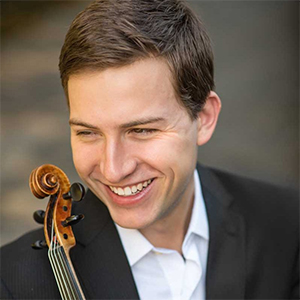By Peter Feher

Yet the focus of this concert was undoubtedly on the exceptional caliber of musician that one can find right here in Cleveland.
Violinist James Thompson — a Northeast Ohio native, graduate of the Cleveland Institute of Music, member of the Chamber Music Society of Lincoln Center, as well as BlueWater’s guest concertmaster this season — was the star of the night. He soared while soloing in Vaughan Williams’ The Lark Ascending, that sentimental favorite that somehow never loses its shine.
This short concerto, which takes off from an 1881 poem of the same name by George Meredith, is unwavering in its lyricism. There’s not even a hint of a storm in the pastoral scene that Vaughan Williams sets, with the small orchestra for the piece only surging in moments of tender emotion.
For his part, Thompson found the song in every single phrase he played. In the fluttering solo passage that opens the work, starting in the violin’s low register and steadily rising to its very highest, he added a handful of subtle portamentos, sliding between notes the way a singer might. Similarly, the folklike melody that breaks out partway through the piece, introduced with a bravura tone by flutist Sean Gabriel, had all the refined passion of lyric poetry.
When the fluttering returned for a final time at the concerto’s conclusion, Thompson bravely ascended to a pair of long-held high notes that still seemed to linger in the air even after they had finished.
Saturday’s program got off to a high-flying start with Finzi’s suite of incidental music for Love’s Labour’s Lost. Although Shakespeare set this early comedy in the Kingdom of Navarre (between present-day France and Spain), the style and sentiment are utterly English. At least, that’s the impression given by Finzi’s score, written to accompany a 1946 BBC broadcast of the play.
After a regal introduction, which nicely showcased BlueWater’s full symphonic sound, the suite settles into a series of character sketches, alternately heartfelt and slapstick. A highlight was violist Laura Shuster’s solo playing, which added a sensitive touch to a couple of scenes.
The evening ended with Haydn’s Symphony No. 104, nicknamed “London” — though it’s one of a dozen symphonies the Austrian composer penned to premiere in the burgeoning world capital. The work is thoroughly cosmopolitan as a result, from a first movement that deploys the sonata form perfected on the continent to a second movement that evokes the serenity of the English countryside.
The third movement is a minuet in the jesting spirit Haydn was known for, and the finale incorporates what could be a folk tune or a street song (sources differ). In any case, Meyer and BlueWater brought all of it off with local flair.
Photo credit: Carlin Ma
Published on ClevelandClassical.com December 10, 2024
Click here for a printable copy of this article


